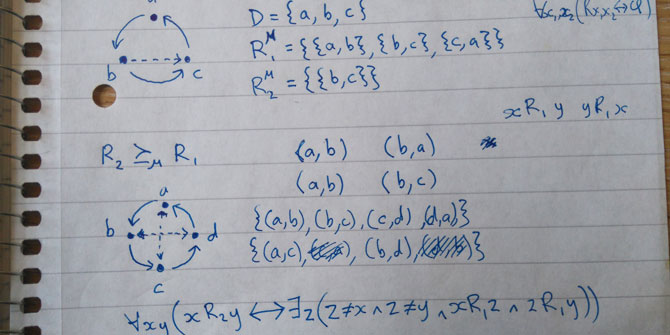Campbell Brown is one of the most recent additions to our faculty. We thought we’d welcome him to the Department with some questions.
Q: Hi Campbell, welcome to the Department. Can you tell us a little bit about your academic background and about what brought you to LSE Philosophy?
A: I’m a product of the Antipodean philosophy scene. I studied philosophy first as an undergraduate at the University of Auckland (in New Zealand, where I was born and raised) and then did my PhD at the Australian National University. The ANU was a wonderful place to be a PhD student. The philosophy department, being strongly research-oriented, held frequent research events – conferences, workshops, seminars, reading groups, etc. – and hosted loads of great visitors. Some of my new colleagues in LSE Philosophy I first met when they were visiting the ANU.
My first academic job was at Bowling Green State University, in Bowling Green, Ohio. (In case you’re wondering, no, there aren’t any bowling greens in Bowling Green, though it is exceptionally flat.) I then moved to Scotland, where I worked first at the University of Edinburgh and then the University of Glasgow. (Don’t ask me which city I prefer – might not be safe to answer!)
I joined the LSE in September of this year. What mainly attracted me to the department was the style of philosophy done here. LSE has strengths both in moral/political philosophy and in what is sometimes called rational choice (decision theory, social choice theory, game theory). I try to keep a foot in both of these camps. (I have a long stride, so it’s not as uncomfortable as it may sound.) LSE is therefore an ideal place for someone like me.
Q: I understand that you’re interested in formal approaches to moral and political philosophy. For the uninitiated, can you give us an example of taking a formal approach to a particular issue in moral or political philosophy?
A: While doing my PhD, I got interested in the issue of “consequentializing” moral theories. Traditionally, consequentialism was considered one of the three or four major moral theories, along with Kantian ethics, contractualism, and/or virtue ethics. These were thought to be mutually exclusive rival options: you had to pick between them. But some philosophers had challenged this traditional picture. They argued that these other theories were not really competitors to consequentialism, but were in fact just different versions of consequentialism. Though not normally presented in this way, these theories could be recast in consequentialist terms: they could be “consequentialized”.
Were this true, it would have quite radical implications for the way we think about moral theories. But I wasn’t convinced that is was true. The arguments seemed inconclusive. Typically, these involved canvassing a few non-consequentialist theories and indicating how these might be conseqentialized. But this seemed insufficient to establish the strong conclusion that all theories can be conseqentialized. This seemed like a “gap” in the literature, an open question that could be answered more systematically and rigorously with the aid of formal methods. Given a suitable formal representation of moral theories, one could then define consequentialism as a condition on this class of theories, and then prove one way or the other whether they all satisfied this condition. So that’s what I set out to do. What I found was that not all theories can be conseqentialized, or at least so I argue in a paper called “Consequentialize This“.
That’s one example from my own work of using formal methods to address a question in moral philosophy. I’m not sure how successful it was. But I like to think that the paper did at least present a novel approach to tackling such questions – and it has a catchy title!
Q: What are the benefits of this kind of formal approach over traditional methods?
A: One great advantage of formal, or mathematical, methods is in the high degree of clarity and precision they bring to questions of structure. What kinds of structure are possible? What are their properties? How are they related to each other? Much of moral and political philosophy – indeed much of philosophy – is centrally concerned with structure. Simon Blackburn suggests a nice analogy: philosophy is “conceptual engineering”. As engineers investigate physical structures (bridges and buildings), philosophers investigate structures of ideas, or theories. Are these consistent and coherent? Do they “hold weight”? The example I gave earlier is about structure. Consequentialism can be thought of as a family of moral theories with a certain sort of structure. (The paper that inspired my interest in the topic was Jamie Dreier’s “Structures of Normative Theories“.)
When dealing with these structural questions, formal methods enable one to think and communicate more clearly and precisely. Here’s another analogy that I like. We can describe music in natural languages like English. We can characterise a piece of music as “loud”, or “fast”, or “uplifting”, etc. But certain contexts, e.g., when composing or performing music, demand a higher degree of precision than is possible in ordinary English. Composers wouldn’t get far saying things like: “Play a loud happy bit for a while, then go a bit quieter and more gloomy”. For this reason, musicians use a special language, a set of concepts and formal notations, with which to express musical ideas more clearly. It can be a bit baffling for the unfamiliar, but once you’ve learned it, this opens up many more possibilities for musical collaboration and creativity. The use of formal methods in philosophy is very similar, I think. Philosophers who work without such methods often seem to spend a lot of time struggling to understand each other. The reason may be that they lack a language precise enough to articulate the complex structures of ideas they are discussing.
Q: Finally, what do you think is the relevance of philosophy?
A: My take on the relevance of philosophy may already be suggested by what I’ve said above. If philosophy is conceptual engineering, then its relevance to thought is like that of real engineering to construction. Philosophy helps us build better views of the world – views that are coherent and unified, rather than arbitrary, ad hoc, or downright inconsistent.
Campbell Brown is a philosopher from New Zealand. He specialises in moral and political philosophy, especially formal approaches to these. He has taught philosophy in five countries. When not philosophising, he likes to play guitar and video games. He draws cartoons, usually during department meetings. And he has a dog called Caprica.
Featured Image Credit: Campbell Brown




